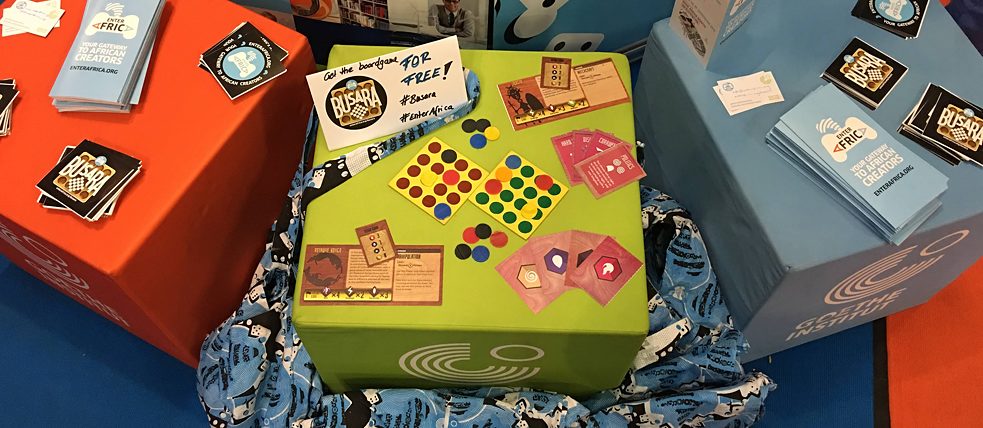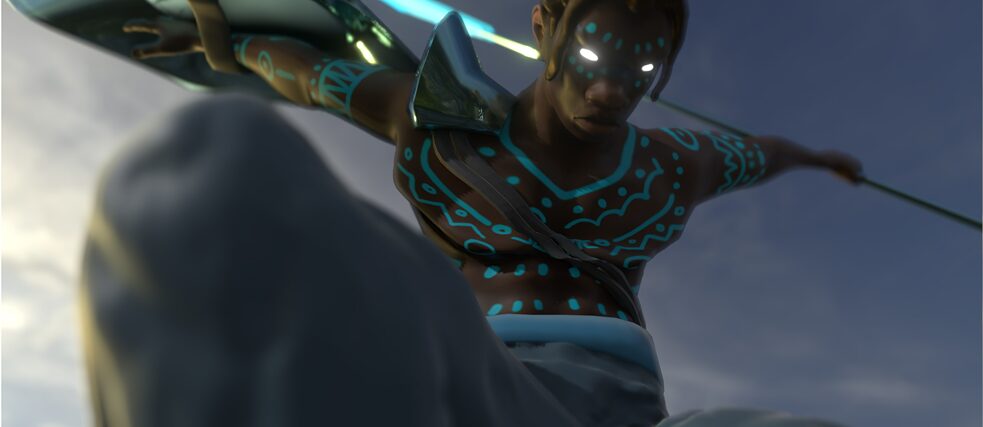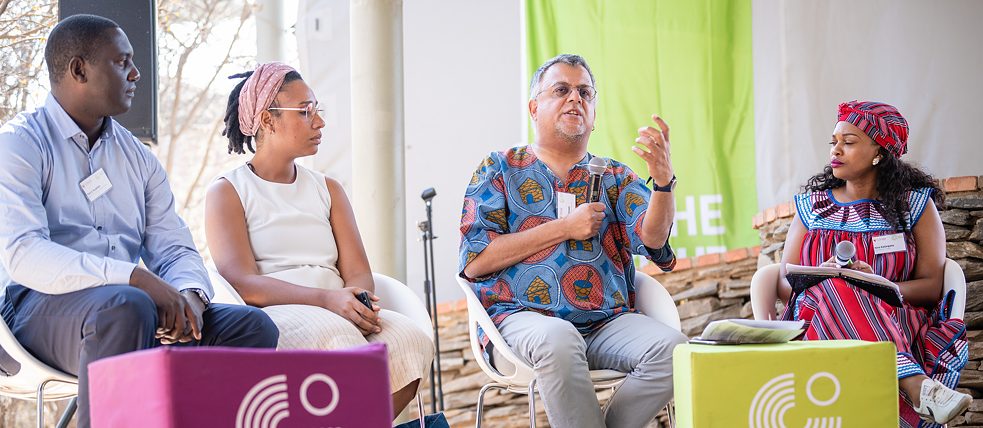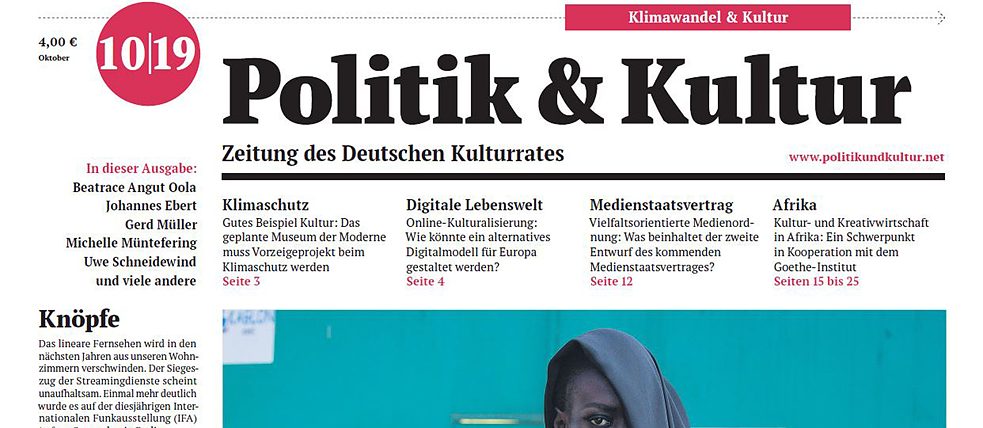Cultural and Creative Industries in Africa
The will to face the future

The African continent is young and full of creativity. The Goethe-Institut supports cultural actors and networks them through projects and exchange platforms. Johannes Ebert, secretary-general of the Goethe-Institut, presents the work of the Goethe-Instituts in the cultural and creative industries in Africa in a special issue of the newspaper Politik und Kultur published together with the German Cultural Council.
By Johannes Ebert, secretary-general of the Goethe-Institut
“New content is lacking worldwide. We’re convinced that Africa can provide this content,” says Dagmawi Bedilu confidently at Gamescom. The software developer from Ethiopia is one of the pioneers of Enter Africa, a transnational African gaming initiative that presented itself at the Cologne games fair in August. In 2017, game designers, artists, urban planners and architects from 15 African countries followed the call of the Goethe-Institut Addis Ababa to jointly develop digital games that strengthen awareness of the challenges of megacities on their continent. For example, a digital hero is fighting a rubbish monster on the world’s largest electronic scrap heap Agbogloshie in Ghana and the Mask of Light is saving the drinking water supply in Dakar.
 Secretary-general Johannes Ebert at Gamescom with Enter Africa | Photo: Stefanie Kastner
Secretary-general Johannes Ebert at Gamescom with Enter Africa | Photo: Stefanie Kastner
Creativity and the will for renewal
"Enter Africa" is one example of the work of the Goethe-Instituts in the cultural and creative industries in Africa. The gaming initiative points into the future and illustrates the great creativity and the will for renewal among young Africans. The game ideas take up social issues. At the same time, the gaming industry is also a growing sector of the creative industries in Africa. This interface between cultural policy and development cooperation is an important aspect of the work of the 15 African Goethe-Instituts, including two liaison offices. Promoting exchange in contemporary culture, creating free spaces for civil society actors, grappling with colonialism, educational programmes especially for young women and, of course, learning the German language as a possible access to study and work are further important focuses of our extensive network, which also includes Goethe Centres, language learning centres and countless local partner institutions from culture and education.
A young continent full of ideas
Africa has 55 countries and 1.3 billion inhabitants. The average age of the population is 18. The continent is young, dynamic and diverse. The population of Africa will at least double by the middle of the twenty-first century. Adolescent young people are increasingly critical and seek their role models far from the political elites. Particularly in the areas of culture, education and society, the young actors stringently articulate their own interests vis-à-vis politics and international donors. Many counter structural deficits with innovative self-organisation. Despite societal challenges such as illiteracy, uneven distribution of wealth and numerous crises, the will to face the future is great in Africa. This is clearly evident in the cultural and creative industries. The start-up scene in Africa is growing continuously and is characterised by young, up-and-coming entrepreneurs. Particularly in the realm of digitisation, viable ideas are being generated in Africa that are intended to make everyday life and mobility easier in African cities.
Confronting the colonial past
Europe is increasingly losing importance as a reference system. Pan-African and the so-called South-South dialogue are gaining in significance in the process of grappling with history and the past and developing distinct African positions. The confrontation with postcolonial issues and the power relations between north and south is of great importance in this regard. At present, this is most evident in the discussions – mainly from a European perspective – about the restitution of cultural assets and the colonial past. One central task of the Goethe-Institut is to introduce voices from African and other former colonial countries into this discourse and to create platforms in which their own African concepts for the future can be developed. One example is the Museum Conversations, in which the Goethe-Institut brings together people from all over the continent to discuss the future of African museums. The results were just compiled at a final conference in Namibia as an important starting point for the development of new museum projects by the Goethe-Instituts and their African partners.
 Discussions during the final conference of the "Museum Conversations" | Photo: CreativeLab for Goethe-Institut Namibia
Discussions during the final conference of the "Museum Conversations" | Photo: CreativeLab for Goethe-Institut Namibia
Platforms for cultural dialogue
Projects such as the Museum Conversations and Enter Africa illustrate another aspect of the colonial past: The nation-state structure of Africa impedes mobility and cross-border encounters, which are becoming more and more important in view of the globalisation of cultural and educational activities and the emergence of new African networks. One way to support this is with mobility programmes such as Moving Africa, which has promoted networking journeys by African artists since the beginning of the Africa Initiative announced by then Foreign Minister Frank-Walter Steinmeier. Platforms for cultural exchange are also increasingly important here. In Music in Africa – a platform initiated by the Siemens Stiftung and the Goethe-Institut – the design of the content and entrepreneurial decisions come from the African foundation of the same name. The German partners bring the players together and offer space, logistics and consulting.
Music in Africa or the film platform ciniDB.africa, which will be launched in November with important impulses from the Federal Foreign Office-funded study Framing the Shot – Key Trends in African Film, are projects that unite both foreign cultural policy aspects of encounter, communication and content, as well as aspects of sustainable development cooperation in line with the definition used by the European Parliament: “Cultural and creative industries are based on cultural values or artistic and other individual or collective creative expressions with a potential to generate innovation, prosperity and jobs by generating social and economic value.”
 Title page of the paper "Politik und Kultur", screenshot | © Paper „Politik und Kultur“
Title page of the paper "Politik und Kultur", screenshot | © Paper „Politik und Kultur“
More strongly networking the creative industries
The projects that the Goethe-Institut has launched in the area of the creative industries can also be seen in this sense. The basic idea behind our work is to give young creative entrepreneurs the opportunity to develop promising ideas that are artistically and creatively valuable and also marketable. Our activities are aimed at creative and innovative cultural and creative professionals from the fields of music, literature, fine and performing arts, film, architecture, (fashion) design and the games industry. For example, the Ayada Lab – in cooperation with the Institut français and funded by the Federal Foreign Office – brings young entrepreneurs from Côte d’Ivoire, Cameroon, Ghana, Nigeria and Senegal together to implement their projects with support from experienced cultural entrepreneurs and mentors. Capacity building is also crucial here.
Since 2018, the Goethe-Institut has also worked in the creative industries together with the Federal Ministry for Economic Cooperation and Development (BMZ). As part of the global Culture and Creative Industries project, the Goethe-Institut, in cooperation with the GIZ, is launching training and networking programmes for actors in local creative industry scenes in South Africa, Kenya, Senegal, Jordan, Lebanon and Iraq. In South Africa, for example, the Goethe-Institut together with the African foundation Triggerfish Academy offers a digital learning platform for budding animation artists, in Senegal it is developing a training academy for music professionals and sound engineers, and in Kenya it cooperates with various local partners to support young, women-led creative companies in particular in their further development.
But back to Gamescom in Cologne: Amid the hustle and bustle of Enter Africa, Kirubel Habtu from Addis Ababa and Adfoyeke Ajayo from Lagos set up the game Busara. Wooden fields, cards and game instructions in African design. Busara is Swahili for wisdom, judgement and common sense. The game illustrates the challenges and opportunities, the wealth and the hope that game designers bring from their countries to create a better society. Playing Busara can offer deeper insights into the current issues faced by the African continent.
This is an abridged version of the article that was published in September 2019 in the paper "Politik und Kultur".